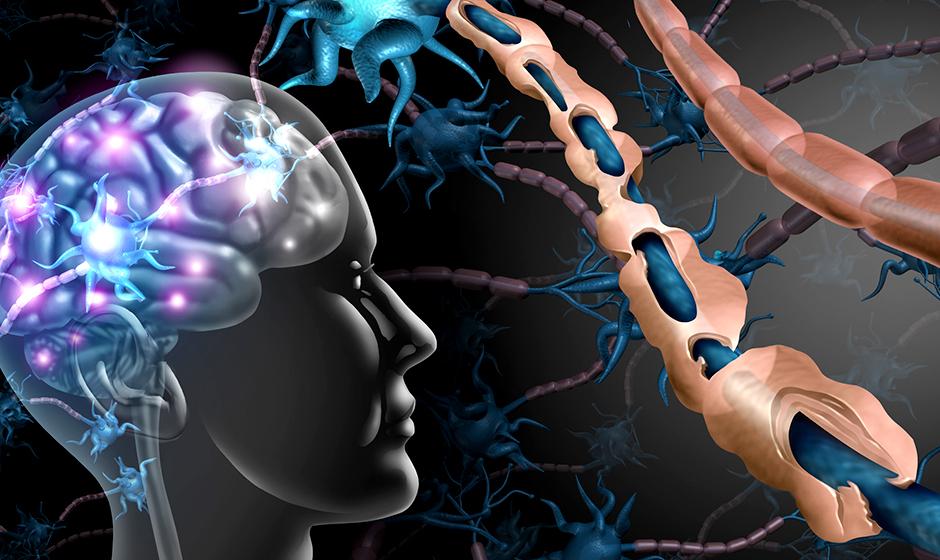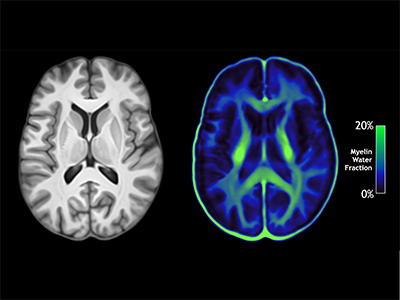
Researchers have created an atlas of myelin among healthy people to support better brain disease diagnosis and timely treatment.
Up until now, normal levels of brain myelin—a key indicator of conditions such as multiple sclerosis (MS), Alzheimer’s disease and concussion—were not well characterized, making the use of it as a diagnostic tool similar to navigating a maze without a map. A new scientific study led by Vancouver Coastal Health Research Institute researcher Dr. Shannon Kolind is the first to discover not only a robust atlas of brain myelin levels, but the key role age plays in their trajectory.
“This road map informs what we can expect normal myelin levels to look like throughout the brain of adults over the course of their lifespan, and can enhance disease diagnostics and detection,” says Kolind.

Published in Nature’s Scientific Reports, the study collected data from 100 adults between the ages of 20 and 78 who underwent myelin water imaging (MWI)—a type of magnetic resonance imaging (MRI)—to characterize their myelin health. Myelin is the fatty layer that sheaths and protects nerve fibers in the brain and spinal cord, similar to the casing around electrical wires.
MRIs turn hydrogen protons in water into weak magnets. During MWI, an approach called a multi-echo T2 relaxation sequence tips the magnetized protons. Researchers then calculate how long it takes for them to tip back, similar to pushing down a spring.

Because myelin is composed of tightly wrapped water-containing packets, a faster tip-back indicates healthy myelin levels. A slower tip-back can indicate missing or damaged myelin, potentially signifying the presence of disease or another condition.
The research team analyzed the MWI images of the study cohort to produce a myelin atlas of what healthy myelin levels should look like at different stages of adult life.
Myelin atlas is the first robust tool of its kind
Consistent with prior studies, researchers found that, on average, myelin levels naturally increased throughout the third decade of life—peaking in the fifth decade—then gradually declined. Unlike prior studies, this cohort was large enough to draw concrete conclusions, notes Adam Dvorak, a PhD student who is conducting the study with Kolind. They also found no statistically significant difference between male and female adults.
“Before this study, if you look at the literature, findings were more inconsistent. We feel confident that we have created a definitive map of adult myelin levels.”
This finding could have significant implications for disease detection, says Dvorak. “There are a huge number of brain conditions that affect myelin, including dementia, MS and brain trauma. This could, for example, help us determine when someone can return to a sport after sustaining a concussion.”
The myelin atlas provides baseline data on what healthy myelin looks like, making it possible for researchers and clinicians to more easily identify if something is amiss.
“MS is a disease that, if caught early, can be managed much better than if a diagnosis is delayed,” says Dvorak. “We hope to integrate this myelin atlas into the MS Clinic at UBC Hospital in some way to support diagnostics, timely clinical care and the development of new medications.”
“Myelin water imaging can be highly useful for medication development, as it provides a quantitative technique to detect, evaluate and track disease.”
Dvorak and Kolind are still collecting data and further improving upon the myelin atlas, adds Dvorak. “We want to add more scans to the atlas and make it more detailed.”
They have also uploaded the myelin atlas and tools as online open-source files, and are looking into collaborations with other departments at UBC and around the world that are setting up similar scans and sharing that data.

Dvorak also plans to hop into MRIs in other hospitals around the world to compare the readings from those machines with the medical images of him taken using the MRIs at UBC. “Checking myelin values for the same person using different MRI machines can help us ensure that we are getting the most accurate values possible.”


